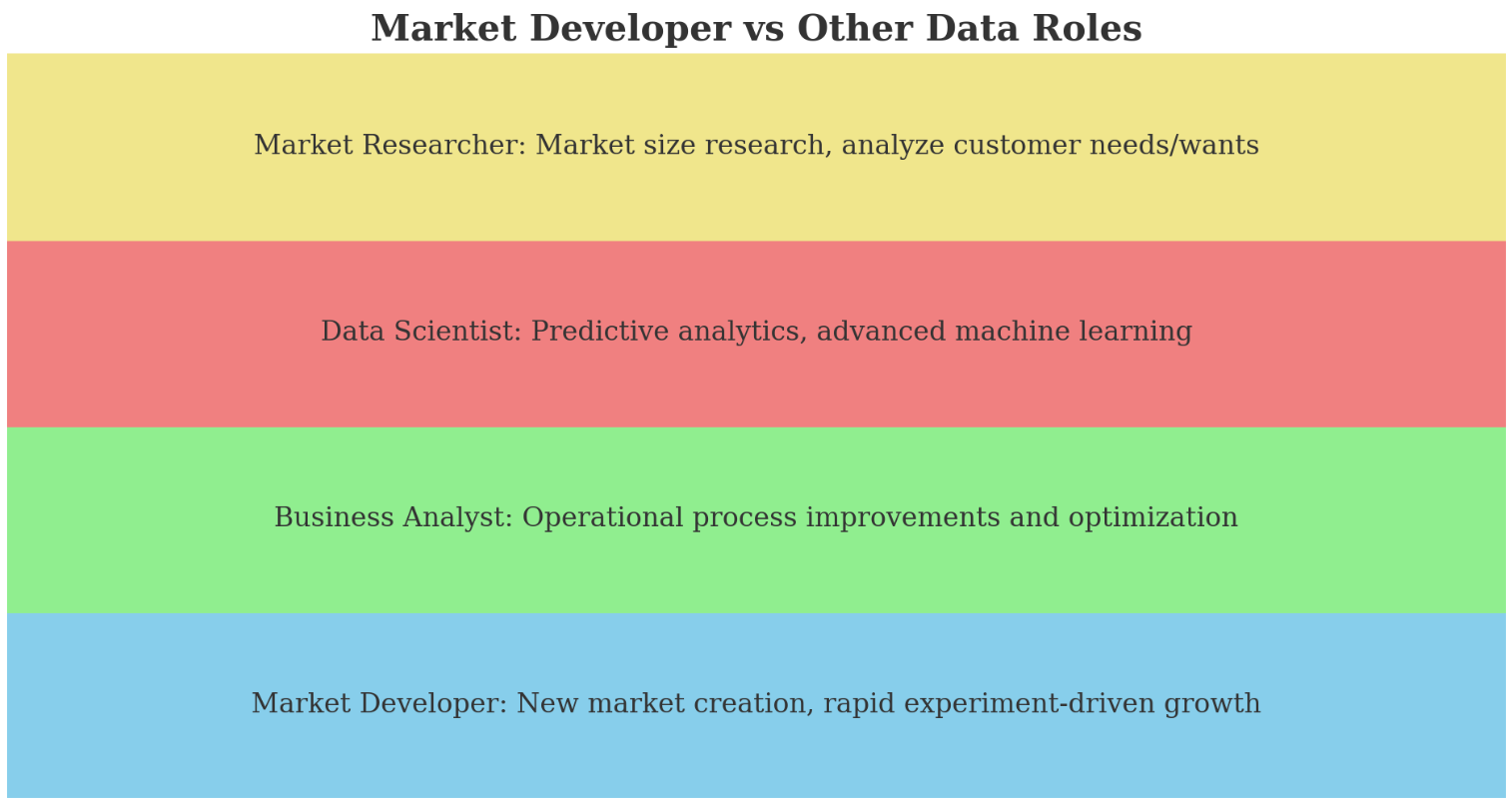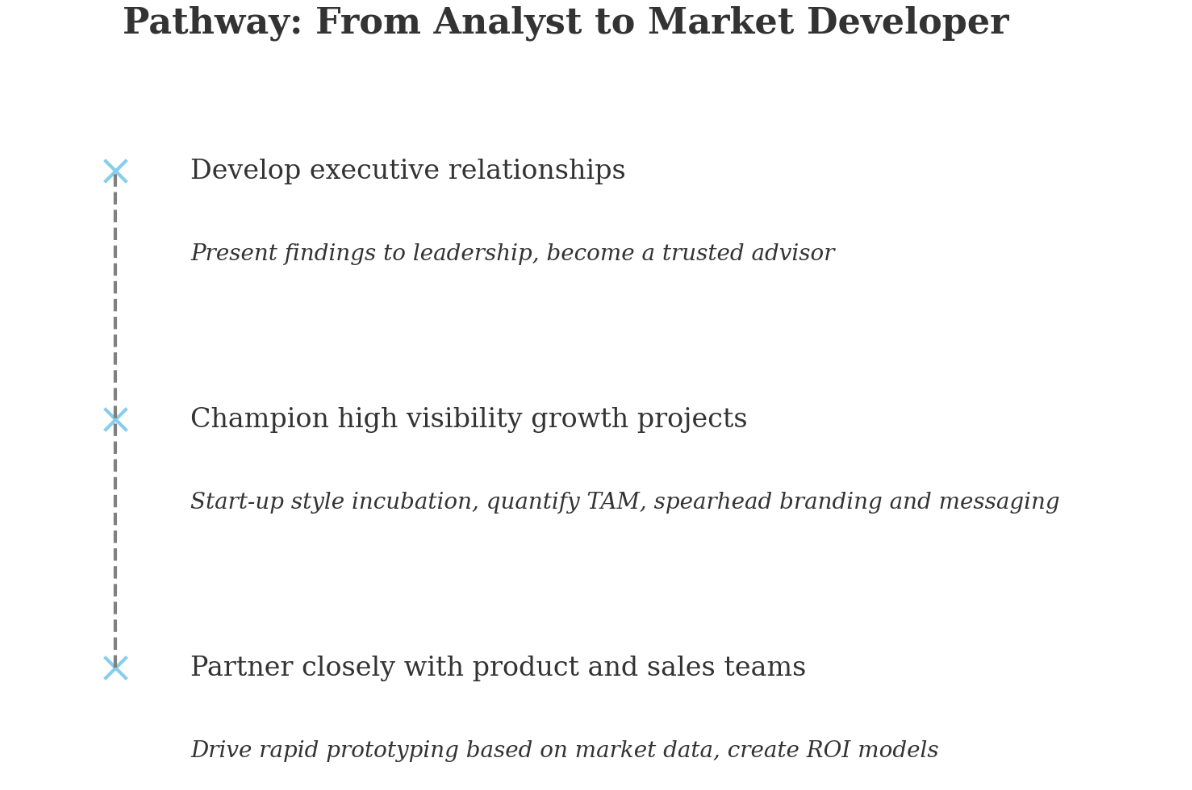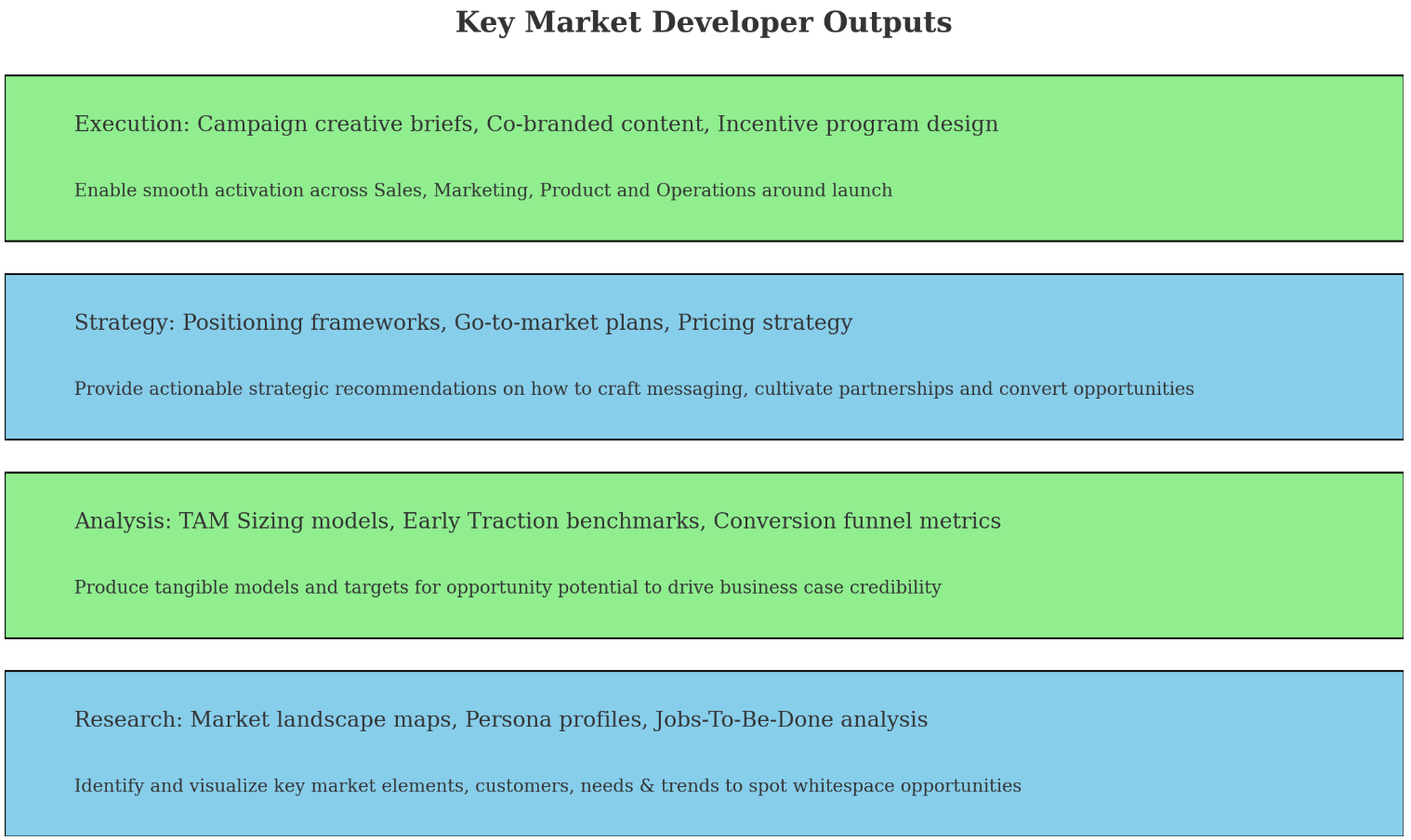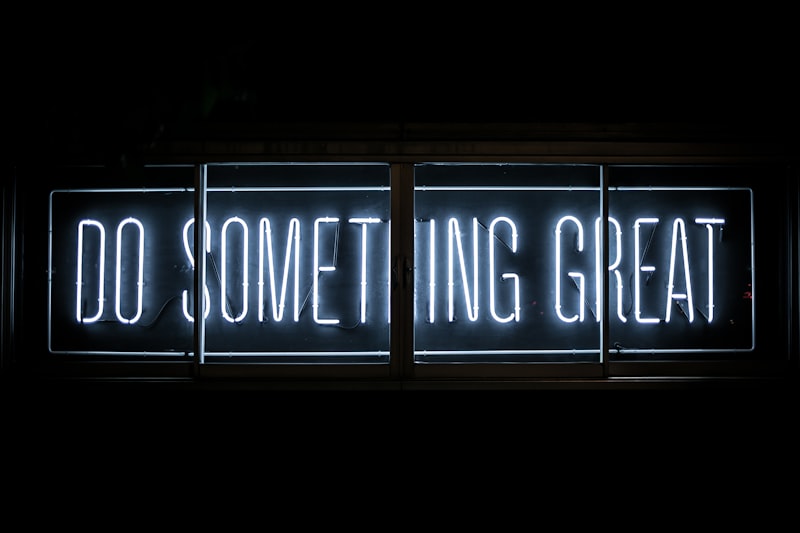"The role of market developer lies at the very heart of catalyzing company growth by creating markets that do not yet exist."
A market developer is a strategic role focused on growing a company's market presence to increase sales revenue. Unlike traditional marketing focused primarily on lead generation, market developers identify, create, and size new high-potential market opportunities.
They drive the full go-to-market execution, from determining product-market fit to developing sales strategies, forming partnerships, releasing products, and analyzing growth data. It's a complex role that requires strong strategic thinking, marketing and sales skills, and leadership capabilities.
If you enjoy cross-functional work spanning research, positioning, messaging, partnerships, product launches and growth analysis, it may be a great career path. Here's a complete overview of what a market developer does and how to become one.

What Does A Market Developer Do?
A market developer wears many hats across four primary areas of responsibility:
Market Opportunity Identification
- Conduct market research to identify untapped customer segments
- Analyze market trends and shifts to discover new opportunities
- Profile target customer personas and quantify the addressable market size
Go-To-Market Strategy Development
- Define the market positioning and messaging strategy
- Craft competitive differentiation and pricing strategies
- Determine ideal sales models and partnerships to penetrate the market
Launch Execution
- Create tailored content, campaigns, and assets to engage the market
- Cultivate meaningful relationships with key strategic partners
- Work closely with Product and Engineering teams on releases
- Continually test and optimize go-to-market plans
Performance Analysis
- Set key performance indicators (KPIs) to track and measure
- Develop models to size market potential over time
- Analyze and report on funnel conversion, retention, and revenue growth
- Provide recommendations to iterate on strategy
They have a birds-eye view of the customer lifecycle and business operations, making data-driven decisions on how to continually expand the company's market opportunity and fuel growth.
Must-Have Market Developer Skills
The breadth of the market developer role requires a versatile skill set with strengths across:
Market Analysis: Strong critical thinking skills to identify shifts in markets, infer trends from sparse data, and determine high-potential opportunities.
Quantitative Analysis: Data manipulation and modeling skills to accurately size markets and model growth trajectories.
Business Strategy: Ability to define strategic positioning, determine pricing models, craft partnership models and develop seller incentive programs.
Marketing: Excellent written and verbal communication to produce compelling messaging and campaigns.
Sales: Experience tailoring collateral and managing partnerships to convert targeted customer segments.
Leadership: Collaborative, decisive and creative problem-solving skills to navigate ambiguity and drive execution across cross-functional initiatives.
Technical Aptitude: Solid data analysis skills and working knowledge of SQL, Excel, Tableau, etc. to manipulate data sets and uncover insights.
It's a highly cross-functional role requiring broad capabilities - strategic thinking, number crunching, communication and collaboration skills, technical literacy and leadership traits are all key.

Common Career Paths To Becoming A Market Developer
There isn't a singular path to becoming a market developer. Professionals from business strategy, marketing, sales or analytics backgrounds who possess the cross-functional skillset can transition into the role.
Here are three of the most common paths:
Business Strategy To Market Developer
Management consultants and corporate strategy professionals who want to apply their analytical capabilities directly to fueling company growth can make the leap to market development.
It allows them to size markets, determine positioning, craft partnership models and perform opportunity analysis to create and propel new growth areas for companies.
Marketing To Market Developer
Marketers who want more ownership of the full marketing process - from research to positioning to messaging to campaign execution and measurement - can find the market developer role a natural fit.
It enables them to apply their core competencies in positioning, branding and campaign development while also acquiring new data analysis, modeling, sales and leadership skills.
Business Intelligence To Market Developer
Business intelligence analysts who want to drive decision making and company growth can pivot into market development. Their analytical skills in SQL, Excel, Tableau and other tools are directly applicable to perform robust data analysis on market opportunities, model future trajectories and continually optimize go-to-market initiatives.
For all paths, pursuing cross-functional projects, shadowing sales reps, leading cross-team initiatives, and continually self-educating across missing capability areas is key to gaining the broad-based skillset required to become an effective market developer.

How To Excel As A Market Developer
Once in the role, here are five key areas to focus on to excel as a market developer:
Adopt a Startup Mindset
In larger companies the role may exist within a single product line or business unit. Use the autonomy to think big and kickstart growth like an internal startup by carving out new opportunities.
Develop a Methodical Workflow
With so many workstreams, develop a consistent workflow focused on research, opportunity analysis, strategy development and go-to-market execution. Embed consistent feedback loops for continuous improvement.
Streamline Cross-Team Collaboration
Get buy-in across stakeholders early when developing market strategies. Foster close relationships with product managers, designers, engineers and sales reps to streamline collaboration during launch and growth initiatives.
Structure Experiments to De-Risk Opportunities
Continually design lightweight experiments - interviews, quick surveys, explainer videos, etc. - to rapidly validate assumptions and reduce risk on opportunities. Prevent over-investment in uncertain outcomes.
Obsess Over Funnel Conversion
Monitor every aspect of the funnel - traffic, leads, demos, trials, conversions, expansions, renewals. Analyze the key fallout points and optimize campaign targeting, messaging, pricing, partnerships and retention techniques.
The market developer role offers huge potential upside for skill development, career growth and directly fueling company success through new market creation and expansion. By adopting a startup mindset, prioritizing workflow and collaboration, structuring rapid experiments and monitoring funnel conversion, professionals can maximize their likelihood of excellence and impact.
FAQ
1. What is the difference between a market developer and a digital marketer?
The key difference lies in their primary focus. Market developers specialize in identifying and creating net-new market opportunities to expand a company's growth horizons. They focus on unearthing customer segments, uses cases and product possibilities that do not yet exist. In contrast, digital marketers focus on generating demand to acquire customers in existing segments the company already serves using tactics like paid ads, website optimization, email nurture campaigns and search engine optimization.
While marketers invest in reaching and converting known prospects, market developers investigate white spaces to carve out new spaces tangent or adjacent to current markets. They determine product-market fit, craft messaging and partnerships, and analytically size opportunities to compel company investment in nascent spaces. It is an extremely strategic, analytically rigorous and experimental role requiring comfort with ambiguity in fostering inorganic growth.
2. What aspects of business strategy consulting are applicable to the market developer role?
Several core competencies from management consulting apply to succeeding as a market developer:
Research orientation - leveraging interviews, analog analysis, surveys and other techniques for qualitative and quantitative market analysis
Intellectual curiosity - actively investigating shifts across industries to uncover adjacency opportunities
Storytelling - distilling complex findings into compelling narratives and models
Toolkit versatility - dynamically selecting appropriate frameworks and analytical approaches based on the business question
Rigor and precision - exhibiting meticulous attention to detail while structuring analysis to drive strategic recommendations
The difference lies in consultants advising clients on strategy whereas market developers need to determine and execute growth strategies themselves.
3. Should a market developer report to Marketing or Sales or exist as an independent department?
There are arguments to be made for pairing market developers under Marketing, Sales or as their own autonomous business unit. Reporting under the CMO allows tighter coordination on messaging, campaigns and budgets while tying them to Sales teams allows ensuring buyer insights shape prospect targeting.
The best organizational structure depends significantly on company size and culture. Earlier stage startups may benefit more from a dedicated horizontal market development team that cuts across divisions. This fosters autonomy in carving out net-new areas and lets developers directly build business cases to secure executive buy-in.
Regardless of structure though, frequent collaboration across Sales, Marketing, Product and Engineering is imperative. Market developers should cultivate partnerships, nurture executive sponsorships and structure workstreams to sync with stakeholder roadmaps for launch and experiment coordination.
4. How can marketers transition into the market developer role?
For marketers looking to move into a market developer role, seeking out the following types of projects and competency building will prepare you for the transition:
- Conduct surveys and interviews to create buyer personas of undeserved customer segments
- Size uncontested market spaces adjacent to current markets to identify growth potential
- Take online courses in SQL, Excel, predictive modeling, funnel analysis and pricing strategy
- Champion a new channel testing initiative - determine positioning, craft messaging and tailored content and monitor adoption
- Volunteer to take over analytics reporting from market researchers to hone data manipulation skills
- Drive end to end development of a new product or business idea not yet served by current company offerings
Gaining more hands-on experience with research, quantitative modeling, technical platforms and directly testing new concepts will allow traditional marketers to exhibit core market developer strengths.
5. What does a typical market developer career trajectory look like?
Like most specialized business roles, there are two primary tracks - growing as an individual contributor or progressing into people management.
As an IC, the progression usually follows:
- Market Development Analyst → Sr. Analyst → Manager → Sr. Manager / Associate Director → Director → Sr. Director / VP
Transitioning to the management track:
- Associate Director → Director → Sr. Director → Head of Market Development → VP Market Development → SVP/EVP Business Development
It's common to see market developers tap on upwards of 7+ years of individual contributor experience before shifting to mentor and develop junior team members. Their cross functional nature also lends itself well to lateral moves into complimentary departments like Corporate Strategy, Product Marketing or Alliance Partnerships.
6. Is the market developer role a good fit for analytical individuals coming from non-business backgrounds?
The market development skillset is highly compatible for those with scientific, engineering or analytics backgrounds given the combination of technical and soft skills required. Several qualifying characteristics that indicate aptitude include:
Intellectually curious - Passionate about understanding drivers, trends and building conceptual models behind markets
Data-driven - Methodologically sifts through market signals to uncover insights
Creative - Able to envision ideas and approaches that do not yet exist
Cross-functional outlook - Seeks to actively collaborate across teams and functions
Business/Commercial acumen - Can balance strategic vision with financial viability and specificity during execution
The role offers the opportunity to apply analytical capabilities directly to expanding company's markets in a fast-paced, collaborative environment.
7. Is this a role supported primarily at larger companies or applicable for startups as well?
While market developers at big companies focus on a specific product line or business unit, startup environments lend themselves even better to leveraging market developer capabilities. Key advantages include:
Autonomy - Startups foster more entrepreneurial risk taking in developing net new areas
Impact - High visibility into directly shaping business trajectory rather than being one of thousands of employees
Connections - Startups enable broader interactions with senior executives
Working as the core market developer evangelist helps startups expand into adjacent markets and avoid prematurely plateauing growth in existing segments. Candidates should screen for innovative startups serving two sided markets so they can shape development of untapped customer personas.
8. What types of interview questions help assess market developer aptitude?
Here are some examples of behavioral and situational questions to evaluate market developer capabilities:
Behavioral questions
- Describe how you identify promising areas for innovation based on trends in current markets and customer needs.
- Share an example of a time you combined insights from qualitative interviews and quantitative data to uncover an impactful insight.
Situational questions
- If our company currently serves mid-market advertising agencies and you had 8 weeks to identify and size a brand new market opportunity where would you start?
- Say you identified small creative hobby bloggers as an underserved customer segment, walk me through how you’d drive adoption from research to execution.
The emphasis should be on assessing strategic thinking, technical analytics, intellectual curiosity, creative ideation and aptitude synthesizing qualitative and quantitative data.
9. How can market developers structure career development plans?
Given the blend of capabilities required, market developers need customized career development spanning:
Strategy immersions - Joining corporate strategy teams undertaking growth planning, M&A diligence and restructuring initiatives
Technical skill building - Dedicating consistent time to learn new data platforms, modeling techniques and experiment analysis frameworks
Leadership training - Volunteering to spearhead cross functional initiatives and drive efforts outside core responsibilities
MarketJumpers community - Engaging knowledge exchanges on growth frameworks like Jobs to be Done and Outcome Driven Innovation
Creating intentional rotations to amplify weak areas, timed off-cycle from core role demands increases dexterity. Learnings then directly apply when resuming market developer planning cycles.
10. What future advancements may shape the evolution of the market developer role?
Several technological and operational trends will shape the role over the next decade, including:
AI/ML adoption - Leveraging predictive modeling and chatbots to identify nascent opportunities earlier and accelerate experiment iteration
Collaborative work tech - Using Miro, Mural and other tools to streamline alignments across product, engineering and sales
Hybrid engagement - Redefining what sales partnerships, product launches and buyer relationships look like in virtual/in-person hybrid models
Web3 wave - New ecosystem economics spawning around crypto, NFTs, Metaverse and decentralization
While data-driven digital transformation will automate parts of the workflow, human creativity, judgment and leadership to forge partnerships remains imperative to becoming trusted growth advisors.



